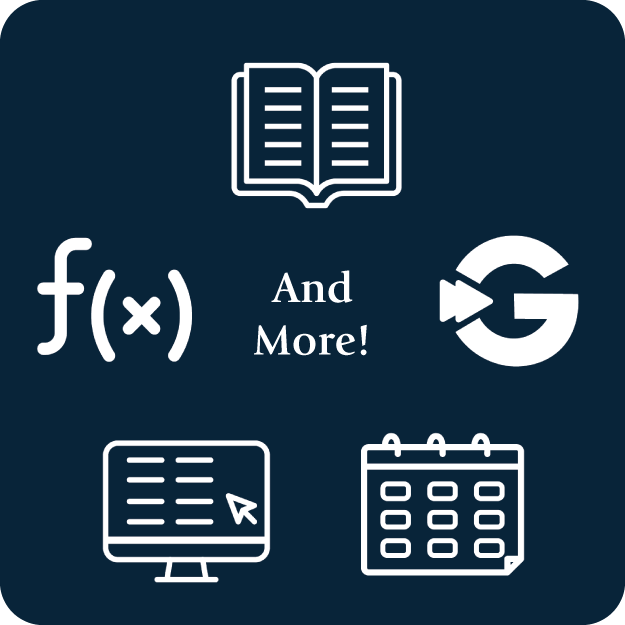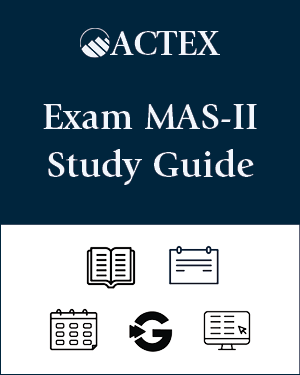Availability
In-StockISBN
Digital: 6 month license - 979-8-89016-534-3 Digital: 12 month license - 979-8-89016-535-0 Printed & Digital: 6 month license - 979-8-89016-536-7 Printed & Digital: 12 month license - 979-8-89016-537-4Currency
All prices shown in USDDigital Terms
Click here to view our digital terms.A new product will be added to your cart each time you click the Product button. If additional options exist (checkboxes) to further customize your product and you'd like to choose one of the them, please select the option before clicking the product button to add to your cart. Click here to edit your cart.
Stay ahead of the curve by using ACTEX materials for MAS II exam prep.
- Study manual - read, learn and gain a strong conceptual understanding of the material
- GOAL - Practice, quiz and text with thousands of problems and solutions
- Instructional Videos - gain deep understanding and visuals to bring extra to your learning
- Flashcards - master key topics and formals and be that much more prepared
- Formula sheets - Recall important formulas and information in an easy to use format


Our Study Manual offers personalized learning on a schedule that works for you.
The Exam CAS MAS-II study manual will allow you to:
- Review 1000+ pages of comprehensive, exam-focused information with full syllabus coverage
- Refine your understanding with almost 200 examples throughout the text
- Practice until you're confident with 420 exercises and 3 practice exams
GOAL: Practice. Predict. Pass.
Reach your target GOAL Score with our proven system.
GOAL offers:
- 900+ exam practice problems with detailed solutions
- A variety of learning modes and difficulty levels
- Customized quizzes: You set the topic, difficulty, number of questions, and a timer
- Simulated exams: Choose from 5 comprehensive exams
- Measure your preparedness with GOAL Score


Instructional Videos
Retain more information with our helpful videos that cover the entire syllabus and further explain the most complex topics.
We've got your covered with:
- 54 instructional videos
- A variety of expert instructors, many of whom are current university professors
- Over 8 total hours of video content
- Now with closed captions in both English and Spanish to make learning more accessible!
Flashcards
Master key topics and formulas with our flashcards, which are rated by exam importance.
- 300+ Virtual Flashcards—great for on-the-go studying!
- An accessible way to cover critical syllabus material you'll need to pass

About the Authors
Jeffrey Pai, Ph.D., ASA, ACIA
Dr. Pai is a Full Professor of Actuarial Mathematics at the Asper School of Business, University of Manitoba. He has an M.S. degree in Actuarial Science and a Ph.D. degree in Statistics from the University of Connecticut, USA. Dr. Pai has taught courses at the Undergraduate, Master, and Ph.D. levels, including most of the actuarial courses offered at the University of Manitoba. He has also taught courses in many countries including the USA (UConn and UC Santa Barbara), Switzerland (University of Basel), Taiwan, Thailand, and China. Dr. Pai has given seminars and published many study manuals in helping students prepare and pass actuarial examinations. He has been serving as an independent reviewer for SOA Exam P since 2013. Dr. Pai has received many congratulation letters from the Dean Office based on his teaching performances. He has also received two outstanding teaching awards in his teaching career. In research, Dr. Pai has published over 40 referred journal papers and received two best paper awards, including the CAS Best Paper Award in 2016.
Hong Li, Ph.D., FSA, ACIA
Dr. Li is an Associate Professor of Economics and Finance at the Gordon S. Lang School of Business and Economics, University of Guelph. He is a fellow of the Society of Actuaries and an associate fellow of the Canadian Institute of Actuaries. Dr. Li has taught various actuarial science and statistics courses at the undergraduate and graduate levels. He has been serving as a grading volunteer and question writer for the SOA QFIPM exam since 2021. Dr. Li has published over 20 refereed journal papers since he obtained his Ph.D. degree in 2015, and has participated in various research projects sponsored by CAS, SOA, and CIA in recent years. He received the 2018 Bob Alting von Geusau Prize for the best paper published in ASTIN Bulletin with a Financial Risk or Enterprise Risk Management focus.
Alisa Walch, M.A., FCAS
Professor Walch is an Associate Professor of Instruction & Actuarial Program Assistant Director at University of Texas at Austin. Professor Walch teaches actuarial science classes, is responsible for semesterly case competitions and serves as faculty advisor for their Actuarial Science Club and Gamma Iota Sigma chapter. Professor Walch also volunteers with the Casualty Actuarial Society and won the New Member Award in 2020. Professor Walch graduated from TCU in 2005 with a Bachelors in Mathematics, then graduated from the UT at Austin in 2008 with a Masters in Actuarial Science. Subsequently, she worked as a Property & Casualty actuary for three years at The Hartford before deciding to switch to academia.
Ambrose Lo Ph.D., FSA, CERA
Ambrose Lo, PhD, FSA, CERA, is the author of several study manuals for professional actuarial examinations and an Adjunct Associate Professor at the Department of Statistics and Actuarial Science, the University of Hong Kong (HKU). He earned his BS in Actuarial Science (first class honors) and PhD in Actuarial Science from HKU in 2010 and 2014, respectively, and attained his Fellowship of the Society of Actuaries (FSA) in 2013. He joined the Department of Statistics and Actuarial Science, the University of Iowa (UI) as Assistant Professor of Actuarial Science in August 2014, and was promoted to Associate Professor with tenure in July 2019. His research interests lie in dependence structures, quantitative risk management as well as optimal (re)insurance. His research papers have been published in top-tier actuarial journals, such as ASTIN Bulletin: The Journal of the International Actuarial Association, Insurance: Mathematics and Economics, and Scandinavian Actuarial Journal. He left the UI and returned to Hong Kong in July 2023.
Besides dedicating himself to actuarial research, Ambrose attaches equal (if not more!) importance to teaching and education, through which he nurtures the next generation of actuaries and serves the actuarial profession. He has taught courses on a wide range of actuarial science topics, such as financial derivatives, mathematics of finance, life contingencies, and statistics for risk modeling. He is the (co)author of the ACTEX Study Manuals for Exams ATPA, MAS-I, MAS-II, PA, and SRM, a Study Manual for Exam FAM, and the textbook Derivative Pricing: A Problem-Based Primer (2018) published by Chapman & Hall/CRC Press. Although helping students pass actuarial exams is an important goal of his teaching, inculcating students with a thorough understanding of the subject and logical reasoning is always his top priority. In recognition of his outstanding teaching, Ambrose has received a number of awards and honors ever since he was a graduate student, including the 2012 Excellent Teaching Assistant Award from the Faculty of Science, HKU, public recognition in the Daily Iowan as a faculty member "making a positive difference in students' lives during their time at UI" for nine years in a row (2016 to 2024), and the 2019-2020 Collegiate Teaching Award from the UI College of Liberal Arts and Sciences.
Chris Groendyke, FSA, PhD
Chris Groendyke, FSA, PhD, is a Professor and Director of Actuarial Science at Robert Morris University. He holds degrees from The University of Texas at Austin and The Pennsylvania State University. His research interests include applications of Bayesian methods to problems in actuarial science; his most recent research involves exploring the spatial correlations in mortality rates. Prior to moving to academia, Chris worked as an actuary at USAA Life Insurance Company for over seven years, doing life insurance pricing and asset/liability management.


 IFoA Core Readings
IFoA Core Readings